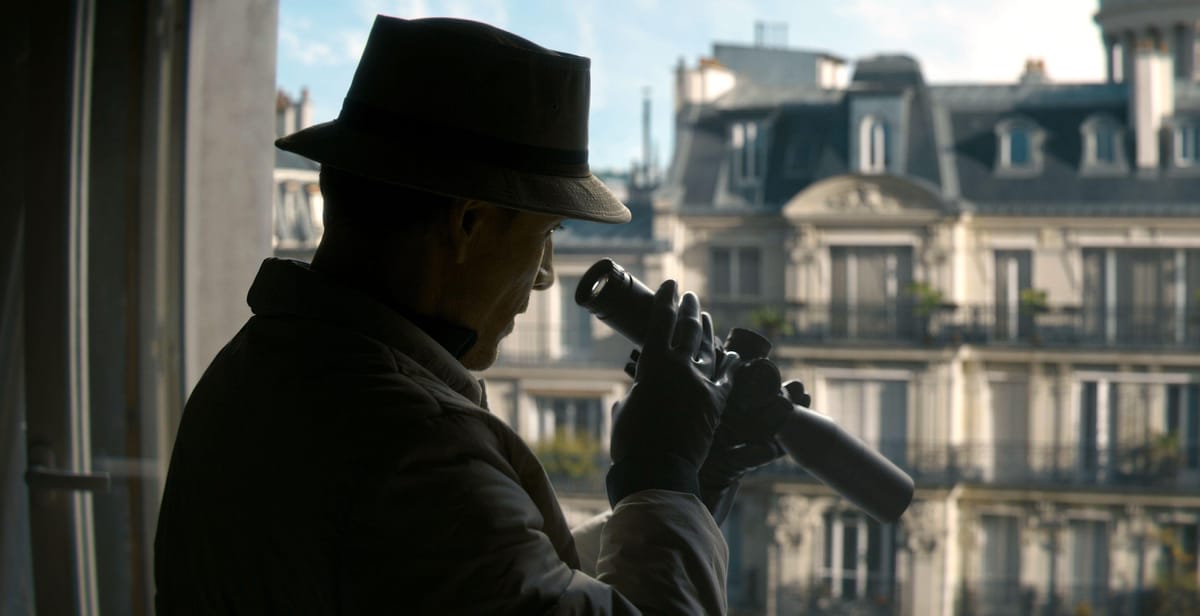A Movie Review Of David Fincher's The Killer
The film is littered with tense moments that'll make you sweat from the comfort of your living room. David Fincher successfully builds anticipation in every important scene, leaving you in a state of bated breath while waiting for the story to unfold.

Decaf Journal is reader-supported. When you buy links through our site, we may earn an affiliate commission.
Esteemed director David Fincher has proven time and again that he's one of the greatest visual storytellers of our generation. With a long list of critically acclaimed titles including Seven, Fight Club, Zodiac, The Girl With The Dragon Tattoo, and Gone Girl, his reputation for consistently producing thought provoking masterpieces precedes him. So when he releases a new film, people tend to stand up and take notice. This was certainly the case for me when The Killer was released in late 2023 exclusively on Netflix. Fincher doesn't make movies for the faint of heart, and The Killer is no exception.
Artists
- Director: David Fincher
- Cinematographer: Erik Messerschmidt
Technical Specifications
- Cameras: Red Komodo 6K, Red Komodo, Red V-Raptor ST, Red V-Raptor XL
- Lenses: Leitz Summilux-C and Fujinon Premier Lenses
Exposition
Starring Michael Fassbender as The Killer, we get to go deep inside his mind from the opening scene. His relaxed voice indicates that he feels nothing as he reveals his dull preparation routine and outwardly mundane existence while scouting a target from across the street high up in an empty office in Paris. He's a professional assassin by trade, with a slow and methodical approach to his craft. He takes a zen attitude towards killing, aided by his cold yet realistic outlook on life. The Killer is skeptical about nearly every rule or faith known to man such as karma, luck, and justice. It's with this belief system that he's able to easily justify his actions in his own mind without a sense of guilt or remorse.
A man with no moral limit, The Killer doesn't take sides and only cares about doing the job well. As he explains his thought process, he demonstrates that he's a meticulous planner in the days leading up to the moment when it's finally time to act. He has storage lockers full of the tools of his trade, multiple license plates, countless weapons, and clever disguises. He has redundancies for his redundancies. Simultaneously, on display is an incredible show of discipline that most people would be unable to sustain. All the while he repeats his mantra:
Stick to the plan. Anticipate, don't improvise. Trust no one. Never yield an advantage. Fight only the battle you're paid to fight. Forbid empathy. Empathy is weakness. Weakness is vulnerability. Each and every step of the way, ask yourself "What's in it for me?" This is what it takes. What you must commit yourself to, if you want to succeed. Simple.
It quickly becomes evident that The Killer is a man that seemingly misses no details and comes across as a true master of his chosen profession. Yet holes are soon poked into his perfectionist mindset when a routine job goes wrong and he misses a high value target, accidentally killing a bystander instead. Here we see an otherwise cool headed assassin begin to panic like an inexperienced gun for hire. We can practically feel his heart pounding out of his chest thanks to the sound of his labored breathing as he rushes away from the crime scene in a desperate bid to escape police scrutiny. Desperate to rid himself of any shred of evidence, he heads to the airport after discarding any incriminating belongings in a bid to leave France immediately.
It would be an understatement to say that his employer is unsatisfied with the outcome of the job. Over a brief phone call, he implies that there will be consequences. The flight back is filled with paranoia, as The Killer wonders if he's being watched. He notices a man is indeed on his tail, and he decides to give up his seat on the connecting flight in order to stay another night at an airline provided hotel and subsequently lose his stalker in the process. In his hotel room, he sits and waits with a knife in hand all night.
The next morning, he uneventfully boards his connecting flight back to the Dominican Republic, which is home to his secret residence. Upon arriving to his secluded paradise, he finds evidence that someone was there before him. Recent shoe prints and cigarette butts in the dirt are waiting for him at his gated entrance. He's instantly alarmed and pulls his pistol from the glove compartment of his Jeep, running towards his house deep in the jungle on foot.
As he approaches nearer with the gun in his hand, he can hear music blaring. He enters to find his home disheveled, the windows open, and blood stains on the floor. Venturing further into the rooms, he sees blood on the walls, broken mirrors, and signs of a violent struggle. Visibly shaken, he picks up the phone to make a call and rushes to the nearby hospital. Upon arriving, he finds his lover barely clinging to life in a private room with her brother keeping a close watch on her condition. She's been severely beaten, but had managed to tell her brother that a man and woman in plain clothes did this to her. She managed to stab the man, break a window, and escape into the jungle where she saw them leaving in a green taxi cab.
It's in this moment that The Killer vows to his lover's brother that nothing like this will ever be allowed to happen again. As he sits with the love of his life, the expression on his face reveals the intense pain that he's experiencing. It's as if his will to go on has departed his body. That night the work begins. He digs up a safe buried in his backyard and retrieves a curated selection of firearms. In the morning, he organizes his clothing, several passports, and multiple phones, as he packs his bags once again. The mission is clear. Anyone who had even a trace of involvement in his lover's attack will pay dearly for what they've done.
Cinematography
Broadly speaking, The Killer is carefully painted with yellow practical light sources and blue ambient light, which is a visual signature in all of David Fincher's films. Think soft and dimly lit, which translates to motivated lighting with beauty as the end result. The visual language of the film leans towards intentionally underlit in a naturalistic sense. Shadows occupy much of the frame and characters are often seen as backlit silhouettes, leaving only our minds to wonder. It feels authentic but still quite visually pleasing.
Fincher's films are famous for limited and deliberate camera movement. The camera is almost always stationary unless the actor moves, and only slightly at that. There are no extreme lens focal length choices here, so you generally won't notice the camera which keeps you engrossed in the story that's being told. However, the footage becomes erratic and slightly shaky at the most dire points when he's trying to escape the police on his moped. The camera work while The Killer rushes away after a botched job is not only riveting in its demonstration of urgency, but beautiful as well. From tasteful anamorphic lens flares from the lights of police cars, to the closeups of his worried face behind the helmet glass as he passes underneath street lamps, the visuals are incredibly well produced in service of the story.
Audio
The sound design in The Killer is an integral part of the film in that it's successful in making you feel strong emotions at just the right moments. Fincher has once again used longtime music collaborators Trent Reznor and Atticus Ross to carefully curate every note that the audience encounters. The music is crucial to the story, and immediately unsettling from the opening credits. The soundtrack is dominated by The Smiths which creates an odd juxtaposition with what The Killer does for a living. The music he listens to is generally upbeat (though perhaps not the lyrics) and inspirational in tone which is in stark contrast to his dark deeds.
At other times, the soundtrack is reduced to suspenseful beats, static noise, and vibrations during tense moments. As he pursues revenge, the sounds become agitating which mirrors his internal struggle. The music is almost always either inappropriately pleasant or extremely unnerving. This outstanding audio production provides an effective contradiction that does a number on the viewer's head and further immerses us into the narrative.
Why You Need To See It
The writing in The Killer is nothing short of brilliant. Michael Fassbender (The Killer) is unintentionally funny with a pleasantly dry delivery of pessimism. Without giving away too much, the timeless Tilda Swinton (The Expert) delivers a mesmerizing performance as always. Swinton provides the perfect counterbalance to Fassbender and brings such a masterful performance in the subtleties of her expression and mannerisms. Director David Fincher is well known for making his actors do dozens of takes in order to get the shot, and it's clear that he was able to bring out the very best in Michael Fassbender and Tilda Swinton.
The film is littered with tense moments that'll make you sweat from the comfort of your living room. Fear can be felt throughout, but it's never terrifying or haunting. David Fincher successfully builds anticipation in every important scene, leaving you in a state of bated breath while waiting for the story to unfold. Fincher also routinely makes use of shockingly explicit violence, which is definitely not for children but it's an effective tool nonetheless.
The story begins with a slow pace, but the viewer is quickly drawn in by the attention gripping narration by The Killer himself. As the film progresses, his seemingly rock solid mental state begins to show cracks. He isn't only fighting the battles he's paid to fight, and he's improvising far more than he's comfortable with. His endless pursuit of revenge takes a visible toll on his entire being. Yet he pushes forward anyway with a relentless focus.
The Killer is a fascinating look at a man who chooses to feel nothing, to show no mercy, and his step by step process to settle a score that can only be repaid in blood. He is the bad guy, but we sympathize with him on some level because of our direct access to his thoughts and rationale. The term "instant classic" is often overused but it's well deserved when talking about this film. If not for the atmospheric world that Fincher has created, then for The Killer's undeniably compelling dialogue:
If you don't want a puzzle solved, remove a piece or two. Scatter the rest.





